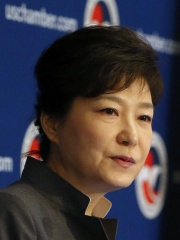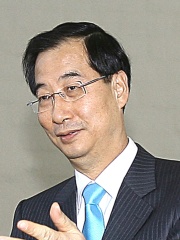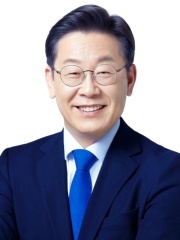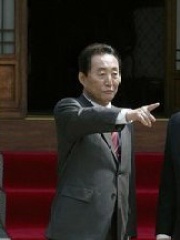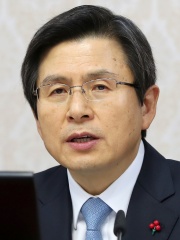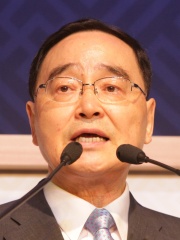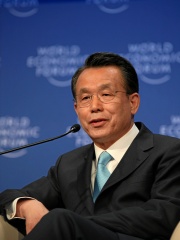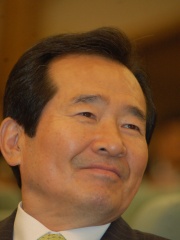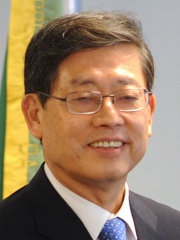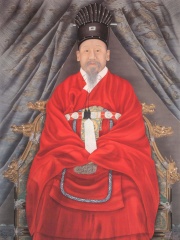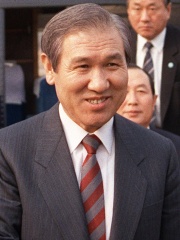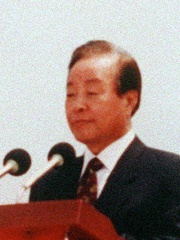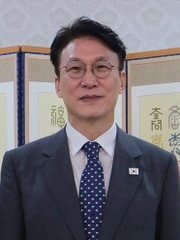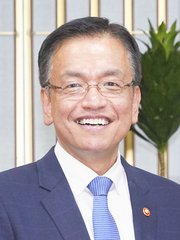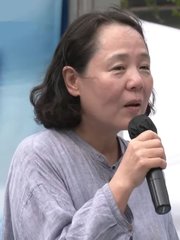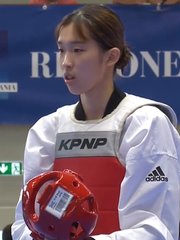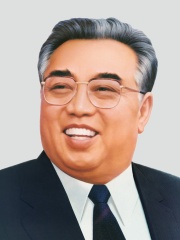
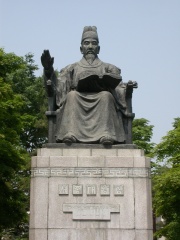
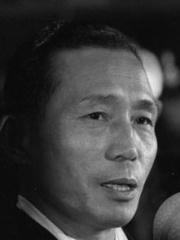
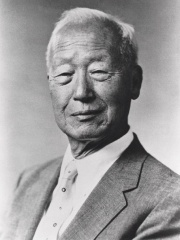
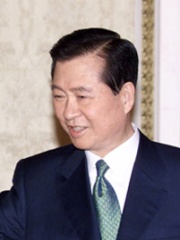
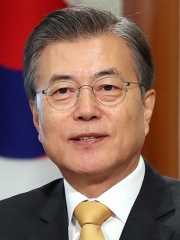
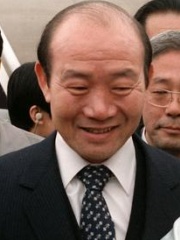
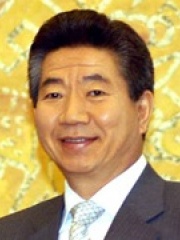
The Most Famous
POLITICIANS from South Korea
This page contains a list of the greatest South Korean Politicians. The pantheon dataset contains 19,576 Politicians, 125 of which were born in South Korea. This makes South Korea the birth place of the 30th most number of Politicians behind Switzerland, and Israel.
Top 10
The following people are considered by Pantheon to be the top 10 most legendary South Korean Politicians of all time. This list of famous South Korean Politicians is sorted by HPI (Historical Popularity Index), a metric that aggregates information on a biography's online popularity. Visit the rankings page to view the entire list of South Korean Politicians.

1. Kim Il-sung (1912 - 1994)
With an HPI of 89.10, Kim Il-sung is the most famous South Korean Politician. His biography has been translated into 139 different languages on wikipedia.
Kim Il Sung (born Kim Song Ju; 15 April 1912 – 8 July 1994) was a North Korean politician, revolutionary, and dictator who founded North Korea (Democratic People's Republic of Korea; DPRK), which he led as its first supreme leader from its establishment in 1948 until his death in 1994. Afterwards, he was succeeded by his son Kim Jong Il and was declared Eternal President. He held the posts of Premier of North Korea from 1948 to 1972 and President of North Korea from 1972 to 1994. He was the leader of the Workers' Party of Korea (WPK) from 1949 to 1994 (titled as chairman from 1949 to 1966 and as general secretary after 1966). Coming to power after the end of Japanese rule over Korea in 1945 following Japan's surrender in World War II, he authorized the invasion of South Korea in 1950, triggering an intervention in defense of South Korea by the United Nations led by the United States. Following the military stalemate in the Korean War, a ceasefire was signed in July 1953. He was the third-longest serving non-royal head of state and government in the 20th century, in office for more than 45 years. Under his leadership, North Korea was established as a totalitarian, socialist, personalist dictatorship with a centrally planned economy. The country had very close political and economic relations with the Soviet Union and China. By the 1960s, North Korea had a slightly higher standard of living than the South, which was suffering from political chaos and economic crises. The situation was reversed in the 1970s, as a newly stable South Korea became an economic powerhouse while North Korea's economy stagnated and then collapsed. Differences emerged between North Korea and the Soviet Union; chief among them was Kim's philosophy of Juche, which focused on Korean nationalism and self-reliance. Despite this, the country received funds, subsidies and aid from the Soviet Union and the Eastern Bloc until the dissolution of the Soviet Union in 1991. The resulting loss of economic aid negatively affected North Korea's economy, contributing to widespread famine in 1994. During this period, North Korea also remained critical of the United States defense force's presence in the region, which it considered imperialist, having seized the American ship USS Pueblo in 1968. This was part of an infiltration and subversion campaign to reunify the peninsula under North Korea's rule. Kim outlived his allies, Joseph Stalin and Mao Zedong, by over four and almost two decades, respectively, and remained in power during the terms of office of six South Korean presidents and ten United States presidents. Known as the Great Leader (Suryong), he established a far-reaching personality cult which dominates domestic politics in North Korea. At the 6th WPK Congress in 1980, his oldest son Kim Jong Il was elected to be a Presidium member and chosen to be his successor, thus establishing the Kim dynasty.

2. Sejong the Great (1397 - 1450)
With an HPI of 82.84, Sejong the Great is the 2nd most famous South Korean Politician. His biography has been translated into 68 different languages.
Sejong (Korean: 세종; Hanja: 世宗; May 15, 1397 – April 8, 1450), commonly known as Sejong the Great (세종대왕; 世宗大王), was the fourth monarch of the Koreanic state Joseon. He ruled from 1418 to his death in 1450. He is widely regarded as the greatest king in Korean history, and is remembered for the creation of Hangul, the native alphabet of the Korean language. Sejong was born the third son of the future King Taejong (r. 1400–1418). He was regarded as gifted, moreso than the troubled crown prince Grand Prince Yangnyŏng. In mid-1418, Yangnyŏng was deposed and Sejong made the crown prince. Months later, Taejong abdicated and Sejong was crowned king. Taejong served as king emeritus until his death in 1422. Sejong's reign was marked by major developments in science, technology, medicine, agriculture, and the arts. Many such efforts Sejong not only oversaw, but actively participated in. In 1420, Sejong had the government research organization Hall of Worthies reestablished. It oversaw such projects as the creations of the first native Korean calendar Ch'ilchŏngsan, the 365-volume medical text Ŭibangyuch'wi, and the agricultural text Nongsa chiksŏl. In 1419, Sejong launched the successful Ōei Invasion against the Japanese Tsushima Island. This was followed by decades of peace and trade between Korea and Japan. Sejong also expanded the northern borders of Korea to roughly its current extent by launching military campaigns against and assimilating the raiding Jurchens, although this region would remain problematic. He also maintained positive relations with Joseon's suzerain Ming while still asserting Korean autonomy. Sejong made significant tax and land reforms, which resulted in increases in agricultural production and a reduction in tax rates, without significant impact to tax income. He also led a massive expansion in the influence of Confucianism in Korea and decrease in the influence of Buddhism. Despite his anti-Buddhist policies, he was privately Buddhist and increasingly vocalized his faith, which put him at odds with the Confucianists of his court. Sejong had recurring and worsening health issues for much of his life. Beginning in 1445, he had the crown prince, the future King Munjong (r. 1450–1452), handle the daily affairs of government. Sejong died at the age of 52 in 1450 and is buried in the tomb Yeongneung. Sejong is regarded as an icon of Korean culture in South Korea, where he has received numerous tributes. Sejong City bears his name. Several North Korean texts reportedly skeptically evaluate Sejong as a feudal oppressor.

3. Park Chung-hee (1917 - 1979)
With an HPI of 81.27, Park Chung-hee is the 3rd most famous South Korean Politician. His biography has been translated into 86 different languages.
Park Chung Hee (Korean: 박정희; [pak̚.tɕ͈ʌŋ.çi] ; 14 November 1917 – 26 October 1979) was a South Korean politician and army officer who served as the third president of South Korea from 1962 after he seized power in the May 16 coup of 1961 until his assassination in 1979. His regime oversaw a period of intense economic growth and transformation, making Park one of the most consequential leaders in Korean history, although his legacy as a military dictator remains a bitter subject. Before his presidency, Park was the second-highest-ranking officer in the South Korean army. His coup brought an end to the interim Second Republic of Korea. After serving for two years as chairman of the military junta, he was elected president in 1963, ushering in the Third Republic. A firm anti-communist, he continued to maintain close ties with the United States, which had maintained a large Army garrison in the country since the end of the Korean War. He supported American military involvement in Southeast Asia, and sent South Korean troops to fight in Vietnam soon after seizing power. Park began a series of economic reforms that eventually led to rapid and unprecedented economic growth and industrialization, a phenomenon that is now known as the Miracle on the Han River. This made South Korea one of the fastest growing economies of the 1960s and 1970s, albeit with costs to labor rights. This era also saw the formation of chaebols: family companies supported by the state similar to the Japanese zaibatsu. Examples of significant chaebols include Hyundai, LG, and Samsung. Although popular during the 1960s, Park's popularity started to plateau by the 1970s, with closer than expected victories during the 1971 presidential election and the subsequent legislative elections. In 1972, Park declared martial law after carrying out a self-coup. He then introduced the highly authoritarian Yushin Constitution, ushering in the Fourth Republic. Now ruling as a dictator, he constantly repressed political opposition and dissent and completely controlled the military. He also had much control over the media and expressions of art. In 1979, Park was assassinated by his close friend Kim Jae-gyu, director of the KCIA, following the Busan–Masan Uprising. Whether the assassination was spontaneous or premeditated remains unclear to this day. Economic growth continued in spite of the 1979 coup d'état and considerable political turmoil in the wake of his assassination. He was soon afterwards succeeded by Choi Kyu-hah, who ruled for only a year before being deposed by career army officer Chun Doo-hwan. The country eventually democratized with the June Democratic Struggle in 1987. Park remains a controversial figure in modern South Korean political discourse and among the South Korean populace in general, making a detached evaluation of his tenure difficult. While some credit him for sustaining economic growth that reshaped and modernized South Korea, others criticize his authoritarian governance (especially after 1971) as well as for prioritizing economic growth and social order at the expense of civil liberties and human rights. A Gallup Korea poll in October 2021 showed Park, Kim Dae-jung (an old opponent of Park whom he tried to have executed), and Roh Moo-hyun as the most highly rated presidents of South Korean history in terms of leaving a positive legacy, especially among South Korean conservatives and the elderly. Park's daughter Park Geun Hye later served as the 11th president of South Korea from 2013 until she was impeached and convicted of various corruption charges in 2017.

4. Syngman Rhee (1875 - 1965)
With an HPI of 81.11, Syngman Rhee is the 4th most famous South Korean Politician. His biography has been translated into 81 different languages.
Syngman Rhee (Korean: 이승만; Hanja: 李承晚; pronounced [iː.sɯŋ.man]; 26 March 1875 – 19 July 1965), also known by his art name Unam (우남; 雩南), was a South Korean politician who served as the first president of South Korea from 1948 to 1960. Rhee was also the first and last president of the Provisional Government of the Republic of Korea from 1919 to his impeachment in 1925 and from 1947 to 1948. His administration was characterised by authoritarianism, limited economic development, and in the late 1950s growing political instability and public opposition to his rule. Born in Hwanghae Province during the Joseon period, Rhee attended an American Methodist school, where he converted to Christianity. He became a Korean independence activist and was imprisoned for his activities in 1899. After his release in 1904, he moved to the United States, where he received degrees from American universities and met Presidents Theodore Roosevelt and Woodrow Wilson. After a brief 1910–12 return to Korea, he moved to Hawaii in 1913. In 1919, following the Japanese suppression of the March First Movement, Rhee joined the right-leaning Korean Provisional Government in exile in Shanghai. From 1918 to 1924, he served as the first President of the Korean Provisional Government until 1925. He then returned to the United States, where he advocated and fundraised for Korean independence. In 1939, he moved to Washington, DC. In 1945, he was returned to US-controlled Korea by the US military. On 20 July 1948, he was elected the first president of the Republic of Korea by the National Assembly, ushering in the First Republic of Korea. As president, Rhee continued his hardline anti-communist and pro-American views that characterized much of his earlier political career. Rhee was president during the outbreak of the Korean War (1950–1953), in which North Korea invaded South Korea. He refused to sign the armistice agreement that ended the war, wishing to have the peninsula reunited by force. After the fighting ended, South Korea's economy lagged behind North Korea's and was heavily reliant on US aid, despite successful efforts to battle illiteracy. After being re-elected in 1956, he pushed to modify the constitution to remove the two-term limit, despite opposition protests. He was reelected uncontested in March 1960, after his opponent Chough Pyung-ok died from cancer before the election took place. After Rhee's ally Lee Ki-poong won the corresponding vice-presidential election by a wide margin, the opposition rejected the result as rigged, which triggered protests. These escalated into the student-led April Revolution, in which police shot demonstrators in Masan. The resulting scandal caused Rhee to resign on 26 April, ushering in the Second Republic of Korea. Following his resignation, he spent a month at the residence Ihwajang and departed for exile in Hawaii by plane on 29 May. However, according to Rhee, he went to Hawaii for medical treatment. Rhee claimed that he was never in exile – he simply was not able to return to his homeland. He spent the rest of his life in exile in Honolulu, Hawaii, and died of a stroke in 1965.
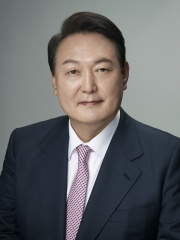
5. Yoon Suk Yeol (b. 1960)
With an HPI of 78.64, Yoon Suk Yeol is the 5th most famous South Korean Politician. His biography has been translated into 80 different languages.
Yoon Suk Yeol (Korean: 윤석열, pronounced [jun sʰʌŋnjʌɭ]; born 18 December 1960) is a South Korean politician and attorney who served as the 13th president of South Korea from 2022 until his removal from office in 2025. A member of the People Power Party during his presidency, he was the shortest-serving directly elected president in the country's democratic history since 1987. Yoon previously served as the prosecutor general of South Korea from 2019 to 2021. Born in Seoul, Yoon received his bachelor's and master's degrees in law from Seoul National University. In his capacity as chief of the Seoul Central District Prosecutor's Office, he played a key role in convicting former presidents Park Geun-hye and Lee Myung-bak for abuse of power. In 2019, President Moon Jae-in appointed Yoon as Prosecutor General of South Korea. Under Yoon's leadership, the Supreme Prosecutor's Office conducted embattled investigations into Cho Kuk, an influential figure in the Moon administration, that led to Cho's resignation as Minister of Justice. Yoon's clashes with the Moon administration prior to his resignation as prosecutor general in 2021 led to his rise as a potential presidential candidate among conservative voters. On 29 June 2021, Yoon announced his candidacy in the 2022 presidential election. He joined the People Power Party (PPP) in July and won its nomination in November. Considered a conservative politician, Yoon ran on a platform promising economic deregulation, opposing feminism and measures such as abolishing the Ministry of Gender Equality and Family. He narrowly defeated Democratic Party nominee Lee Jae Myung by less than a percentage point on 9 March 2022 and assumed office as president on 10 May, becoming the first elected president to be born after the end to fighting in the Korean War. During his presidency, Yoon pursued friendlier relations with Japan and the United States, and has been described as hawkish toward North Korea. His handling of the Seoul Halloween crowd crush in 2022 and the medical crisis has attracted criticism. In the 2024 parliamentary midterm elections, Yoon's party suffered a defeat, which weakened his political power. Under Yoon's tenure, South Korea underwent democratic backsliding and a shift towards authoritarianism. He received mostly low approval ratings as president and had been described as a lame duck. On 3 December 2024, Yoon declared martial law, the first time it had been declared in South Korea since the military dictatorship of Chun Doo-hwan in 1980. He accused members of the National Assembly of supporting North Korea, but lifted martial law after the Assembly passed an emergency motion nullifying the declaration a few hours later. Amid widespread criticism and mass protests, an impeachment motion was introduced against Yoon the next day, though it fell short of the 200 votes needed to pass. Yoon was successfully impeached and suspended from his presidential powers in a second vote ten days later. Yoon subsequently became the first sitting president in South Korean history to face an arrest warrant and, in January 2025, the first to be arrested and incarcerated. On 4 April, the Constitutional Court unanimously upheld Yoon's impeachment by the National Assembly, officially terminating his presidency. Yoon announced his departure from the PPP in May. Yoon is currently being investigated for heading an insurrection, and may face either life imprisonment or the death penalty if convicted.

6. Kim Dae-jung (1924 - 2009)
With an HPI of 78.26, Kim Dae-jung is the 6th most famous South Korean Politician. His biography has been translated into 83 different languages.
Kim Dae-jung (Korean: 김대중; Hanja: 金大中, pronounced [kim.dɛ.dʑuŋ]; baptismal name: Thomas More, Korean: 토마스 모어; 6 January 1924 – 18 August 2009) was a South Korean politician, activist and statesman who served as the eighth president of South Korea from 1998 to 2003. Kim entered politics as a member of the new wing of the Democratic Party. He was an opposition politician who carried out a democratization movement against the military dictatorship from the Third Republic in the 1960s to the Fifth Republic in the 1980s. He ran unsuccessfully in presidential elections in 1971, 1987, and 1992. In the country's 15th presidential election in 1997, he defeated Grand National Party candidate Lee Hoi-chang through an alliance with Kim Jong-pil and DJP. Kim was the first opposition candidate to win the presidency. At the time of his inauguration in 1998, he was 74 years old, making him the oldest president in Korean history. He promoted the Sunshine Policy, a policy of détente toward North Korea, and held the first-ever inter-Korean summit with North Korean leader Kim Jong Il in June 2000. He was a 2000 Nobel Peace Prize recipient for his work for democracy and human rights in South Korea and in East Asia in general, and for peace and reconciliation with North Korea and Japan in December 2000. He was the first South Korean to be awarded a Nobel Prize, the second being awarded to Han Kang in 2024 for Literature. He was sometimes referred to as "the Nelson Mandela of Asia". After completing his term in 2003, he died at the age of 85 on 18 August 2009, due to multiple organ failure and respiratory distress syndrome caused by pneumonia.

7. Moon Jae-in (b. 1953)
With an HPI of 77.26, Moon Jae-in is the 7th most famous South Korean Politician. His biography has been translated into 92 different languages.
Moon Jae-in (Korean: 문재인, pronounced [mun.dʑɛ.in] ; born 24 January 1953) is a South Korean politician and lawyer who served as the 12th president of South Korea from 2017 to 2022. A member of the Democratic Party of Korea (DPK), he was the party's leader from 2015 to 2016 and also represented Sasang in the National Assembly from 2012 to 2016. Before his presidency, he served as the senior secretary for civil affairs and the chief of staff to President Roh Moo-hyun. Born in Geoje to North Korean refugees, Moon was raised in poverty in Busan. He excelled in school and studied law at Kyung Hee University. He became a lawyer and was involved in human rights activism with Roh Moo-hyun. He was imprisoned for organizing a protest against the Yushin Constitution. As a result of his work in human rights law, Moon was chosen to be Roh's campaign manager in the 2002 presidential election. He served in Roh's administration in various official capacities. In 2012, Moon was a candidate for the Democratic United Party in the 2012 presidential election, which he lost to Park Geun Hye. In the 2017 presidential election, Moon was elected president as the Democratic Party of Korea candidate after Park Geun Hye was impeached and removed from office. As president, Moon received international attention for his meetings with North Korean leader Kim Jong Un at inter-Korean summits in April, May, and September 2018, making him the third South Korean president to meet their North Korean counterpart. On June 30, 2019, he met with both Kim and U.S. president Donald Trump at the Korean Demilitarized Zone (DMZ). During his presidency, Moon favored the Sunshine Policy, a peaceful approach to Korean reunification. On economic policy, he favored reform of chaebols (conglomerates), raised the minimum wage by more than 16%, and lowered the maximum workweek from 68 to 52 hours. During the COVID-19 pandemic in South Korea, Moon received praise domestically and internationally. His party won a historic victory in the 2020 South Korean legislative election. However, his party lost the next presidential election, making him the first president since South Korea's democratization in 1987 to transfer power to the opposition after a single term. He left office in May 2022, succeeded by his former prosecutor general, Yoon Suk Yeol.

8. Chun Doo-hwan (1931 - 2021)
With an HPI of 77.25, Chun Doo-hwan is the 8th most famous South Korean Politician. Her biography has been translated into 60 different languages.
Chun Doo-hwan (Korean: 전두환; pronounced [tɕʌn du.ɦwɐn]; 18 January 1931 – 23 November 2021) was a South Korean army general who served as the fifth president of South Korea from 1980 to 1988. A member of the Democratic Justice Party, he ruled the country as a military dictator following a successful coup in December 1979. The period encompassing his presidency is known as the Fifth Republic of Korea. Born in Hapcheon County, Empire of Japan, Chun graduated from Korea Military Academy in 1955 with a bachelor's degree in science. He usurped power after the 1979 assassination of president Park Chung Hee, who was himself a military dictator who had ruled since 1961. Chun orchestrated the 12 December 1979 military coup, then cemented his military in the 17 May 1980 military coup in which he declared martial law and later set up a concentration camp for "purificatory education". He established the Fifth Republic of Korea on 3 March 1981. He governed under a constitution somewhat less authoritarian than Park's Fourth Republic, but still held very broad executive power, and used extreme violence to maintain it. During his tenure, South Korea's economy grew at its highest rate ever, achieving the country's first trade surplus in 1986. After the June Struggle democratization movement of 1987, Chun conceded to allowing the December 1987 presidential election to be free and open. It was won by his close friend and ally Roh Tae-woo, who continued many of Chun's policies during his own rule into the 1990s. In 1996, Chun was convicted by the Seoul High Court on multiple charges, including treason and insurrection, for orchestrating the 1979 coup d'état and unlawfully declaring martial law to subdue the National Assembly and suppress the Gwangju Uprising. The conviction was upheld by the Supreme Court in April of the following year; however, in December, President Kim Young-sam, on the advice of the incoming President-elect Kim Dae-jung—whom Chun's administration had sentenced to death two decades earlier—pardoned both Chun and Roh, the latter having been sentenced to 17 years. Chun and Roh were fined $203 million and $248 million respectively, amounts that were embezzled through corruption during their regimes, which were mostly never paid. In his final years, Chun was criticized for his unapologetic stance and the lack of remorse for his actions as a dictator and his wider regime. Chun died on 23 November 2021 at the age of 90 after a relapse of myeloma.

9. Roh Moo-hyun (1946 - 2009)
With an HPI of 76.65, Roh Moo-hyun is the 9th most famous South Korean Politician. His biography has been translated into 75 different languages.
Roh Moo-hyun (Korean: 노무현, pronounced [no muçʌn]; 1 September 1946 – 23 May 2009) was a South Korean politician and lawyer who served as the ninth president of South Korea from 2003 to 2008. Roh's pre-presidential political career was focused on human rights advocacy for student activists in South Korea. His electoral career later expanded to a focus on overcoming regionalism in South Korean politics, culminating in his election to the presidency. He achieved a large following among younger internet users, which aided his success in the presidential election. Roh's election was notable for the arrival in power of a new generation of Korean politicians, the so-called 386 Generation (people in their thirties, when the term was coined, who had attended university in the 1980s and who were born in the 1960s). This generation had been veterans of student protests against authoritarian rule and advocated a conciliatory approach towards North Korea, even at the expense of good relations with the United States. Roh himself was the first South Korean president to be born after the end of Japanese rule in Korea. South Korea received the highest marks on the Reporters Without Borders Press Freedom Index under his administration. The value of the South Korean won against the US dollar was the strongest during his administration since 1997. Due to the strong currency, for the first time in history, South Korea became the world's 10th largest economy and exceeded the $20,000 milestone in nominal GDP per capita during his administration. However, despite high expectations at the beginning of his presidency, Roh encountered strong opposition from both the opposition conservative Grand National Party and media, and he was frequently accused of incompetence. As a result, many of Roh's policies, such as a plan to move the capital of South Korea and a plan to form a coalition with the opposition, made little progress. Because of his poor performance in economy and diplomacy, Roh was not a popular president, having the worst approval rating on average ever recorded in South Korean political history. His economic policy was often criticized for persisting with certain obsolete economic views and failing certain livelihood issues. After leaving office, Roh returned to his hometown of Bongha Maeul. He ran a duck farm and lived an ordinary life, sharing it through his blog. He also ran a website called "Democracy 2.0" to promote healthy online discussions. Fourteen months later, Roh was suspected of bribery by prosecutors, and the subsequent investigations attracted public attention. Roh committed suicide on 23 May 2009 when he jumped from a mountain cliff behind his home, after saying that "there are too many people suffering because of me" on a suicide note on his computer. About 4 million people visited Roh's hometown Bongha Village in the week following his death. His suicide was confirmed by police. Prosecutor General Lim Chae-jin resigned due to growing public criticism following Roh's death. Public opinion on Roh has improved considerably since his death, which has taken into account his human rights background and national economic progress during his presidency. In a 2019 Gallup Korea poll, Roh was cited as the most popular president in South Korean history amongst the general public.
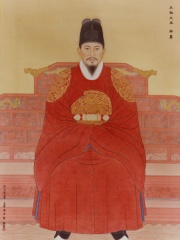
10. Jeongjo of Joseon (1752 - 1800)
With an HPI of 76.44, Jeongjo of Joseon is the 10th most famous South Korean Politician. His biography has been translated into 34 different languages.
Jeongjo (Korean: 정조; Hanja: 正祖; 28 October 1752 – 18 August 1800), personal name Yi San (이산; 李祘), sometimes called Jeongjo the Great (정조대왕; 正祖大王), was the 22nd monarch of the Joseon dynasty of Korea. He was the second son of Crown Prince Sado and Lady Hyegyŏng, and succeeded his grandfather, King Yeongjo, in 1776. His father, Crown Prince Sado, was executed in 1762, leading to conflicts over Yi San’s legitimacy as heir. As king, he sought to clear his father’s name, balance political factions, and strengthen royal authority. He built the Hwaseong Fortress, reformed governance, and promoted talented scholars. Facing assassination attempts, he created the Changyongyeong royal guards. Jeongjo established the Kyujanggak royal library, expanded social mobility, and encouraged Neo-Confucian scholarship. His reign marked a cultural and political renaissance, but factional struggles persisted. He is also remembered for his various efforts to reform and improve the nation. The era of Jeongjo's rule is considered one of the highest points of the Joseon era and today he is generally considered to be among the greatest leaders in Korean history.
People
Pantheon has 125 people classified as South Korean politicians born between 333 BC and 2001. Of these 125, 46 (36.80%) of them are still alive today. The most famous living South Korean politicians include Yoon Suk Yeol, Moon Jae-in, and Park Geun-hye. The most famous deceased South Korean politicians include Kim Il-sung, Sejong the Great, and Park Chung-hee. As of April 2024, 19 new South Korean politicians have been added to Pantheon including Kim Min-seok, Choi Sang-mok, and Kim Jong Yang.
Living South Korean Politicians
Go to all RankingsYoon Suk Yeol
1960 - Present
HPI: 78.64
Moon Jae-in
1953 - Present
HPI: 77.26
Park Geun-hye
1952 - Present
HPI: 76.28
Han Duck-soo
1949 - Present
HPI: 73.11
Lee Jae-myung
1964 - Present
HPI: 67.77
Goh Kun
1938 - Present
HPI: 65.56
Hwang Kyo-ahn
1957 - Present
HPI: 65.37
Ri Chun-hee
1943 - Present
HPI: 65.30
Chung Hong-won
1944 - Present
HPI: 64.27
Han Seung-soo
1936 - Present
HPI: 64.22
Chung Sye-kyun
1950 - Present
HPI: 60.57
Kim Hwang-sik
1948 - Present
HPI: 60.26
Deceased South Korean Politicians
Go to all RankingsKim Il-sung
1912 - 1994
HPI: 89.10
Sejong the Great
1397 - 1450
HPI: 82.84
Park Chung-hee
1917 - 1979
HPI: 81.27
Syngman Rhee
1875 - 1965
HPI: 81.11
Kim Dae-jung
1924 - 2009
HPI: 78.26
Chun Doo-hwan
1931 - 2021
HPI: 77.25
Roh Moo-hyun
1946 - 2009
HPI: 76.65
Jeongjo of Joseon
1752 - 1800
HPI: 76.44
Gojong of Korea
1852 - 1919
HPI: 76.40
Empress Gi
1315 - 1369
HPI: 75.60
Roh Tae-woo
1932 - 2021
HPI: 75.38
Kim Young-sam
1927 - 2015
HPI: 75.34
Newly Added South Korean Politicians (2025)
Go to all RankingsKim Min-seok
1964 - Present
HPI: 59.66
Choi Sang-mok
1960 - Present
HPI: 59.27
Kim Jong Yang
1961 - Present
HPI: 53.59
Lim Su-kyung
1968 - Present
HPI: 45.17
Ha Seung-jin
1985 - Present
HPI: 40.01
Young Kim
1962 - Present
HPI: 39.92
Choi Eun-kyung
1984 - Present
HPI: 37.37
Cho Min-ho
1987 - 2022
HPI: 36.90
Cho Ha-ri
1986 - Present
HPI: 36.85
Byun Chun-sa
1987 - Present
HPI: 36.04
Kim Yu-jin
2000 - Present
HPI: 35.85
Kim Eun-jung
1990 - Present
HPI: 35.71
Overlapping Lives
Which Politicians were alive at the same time? This visualization shows the lifespans of the 25 most globally memorable Politicians since 1700.

